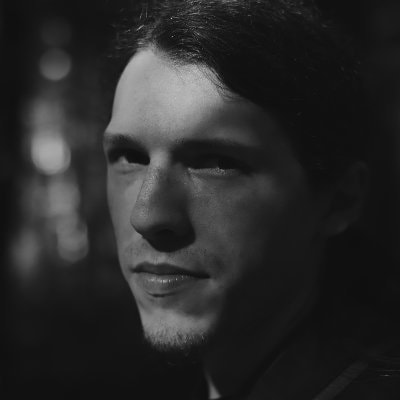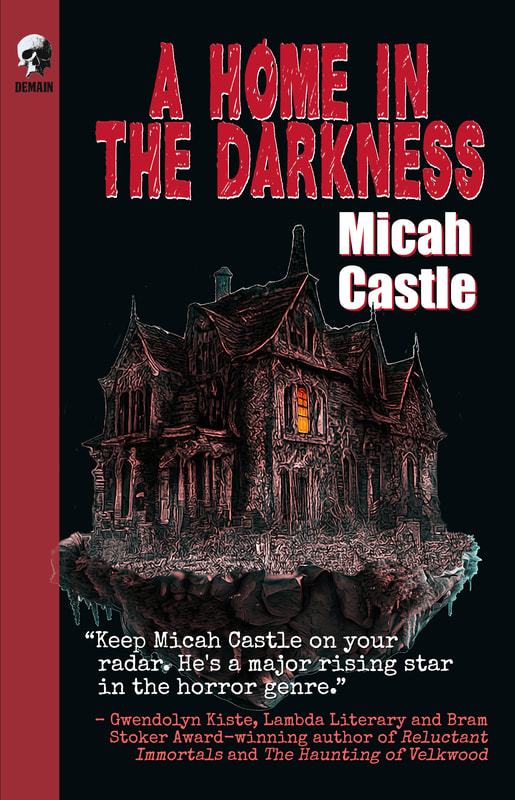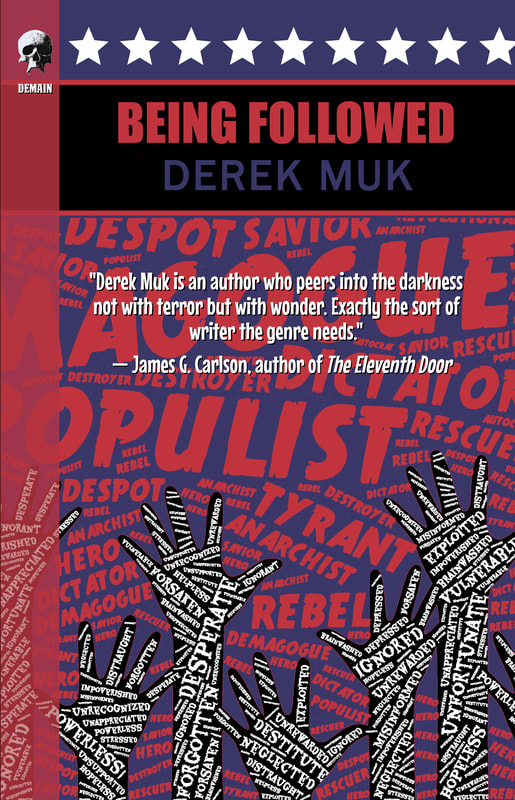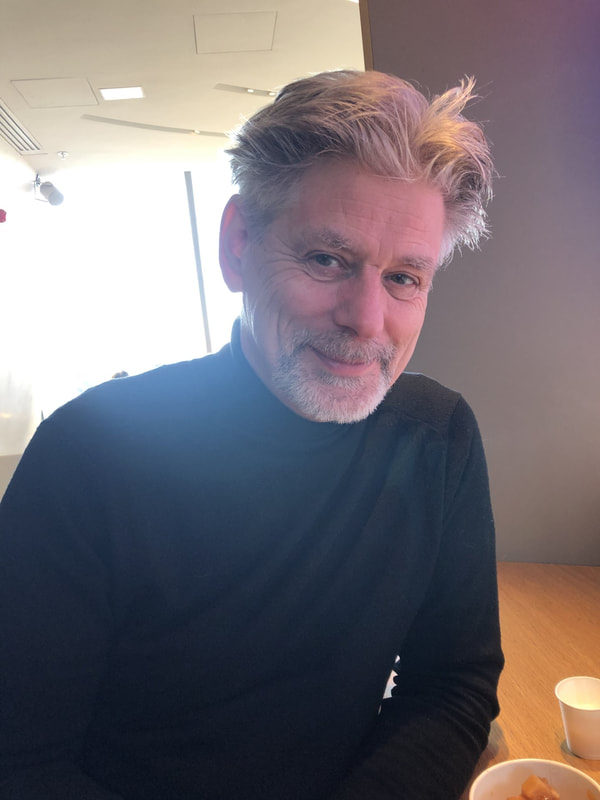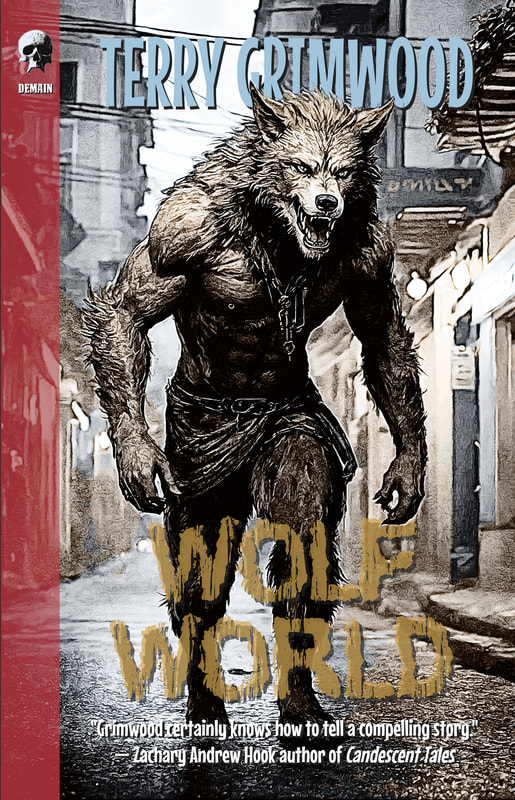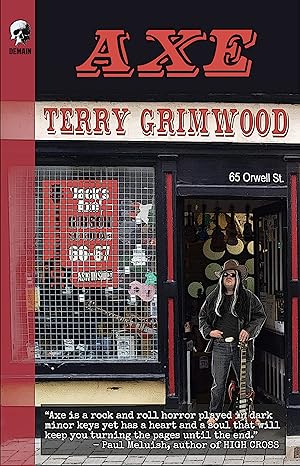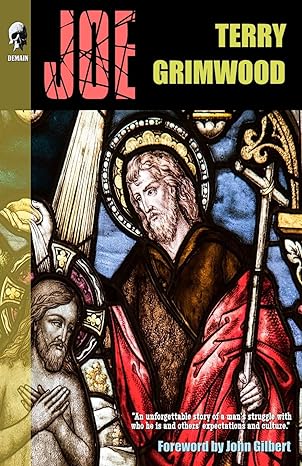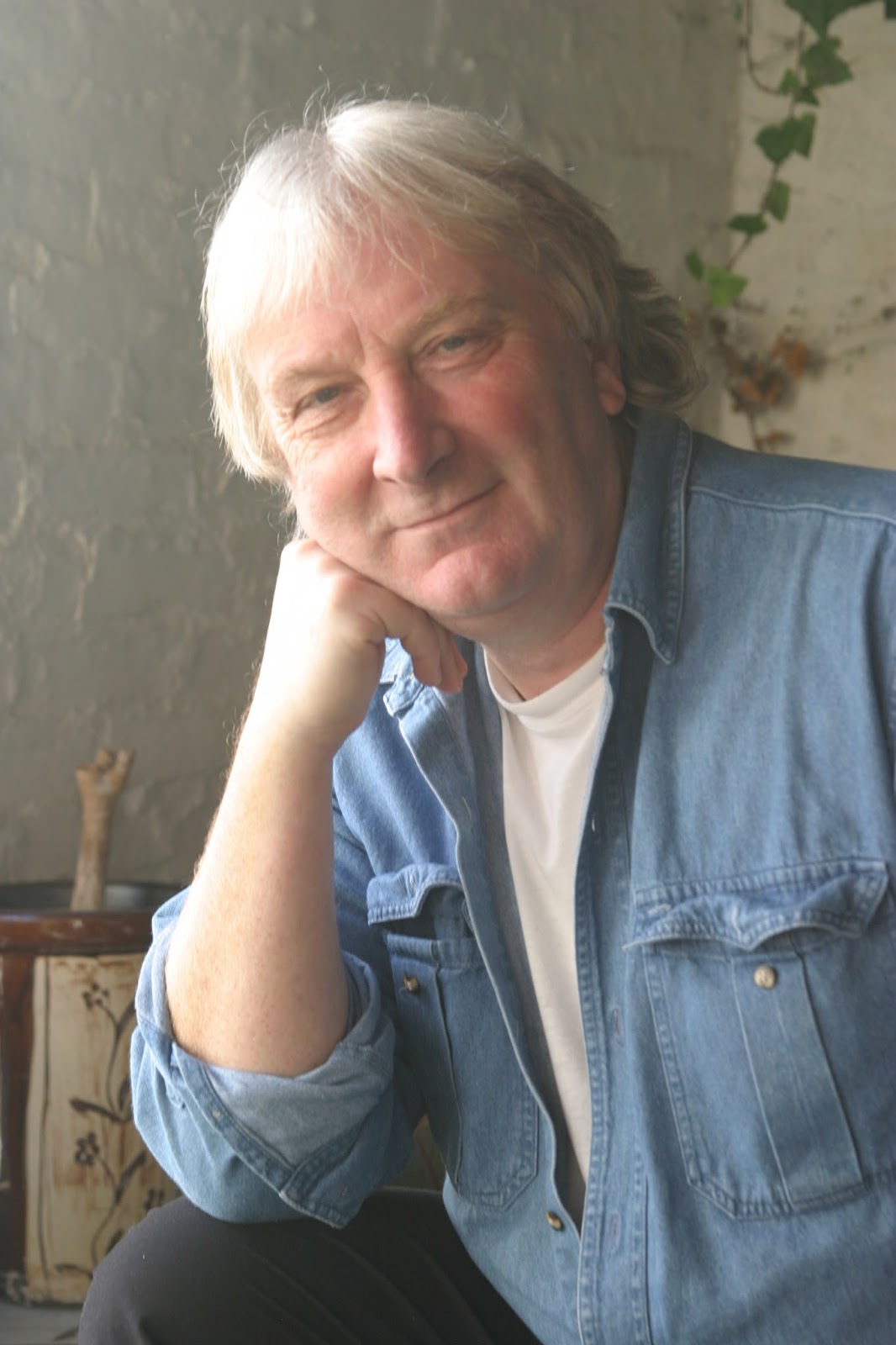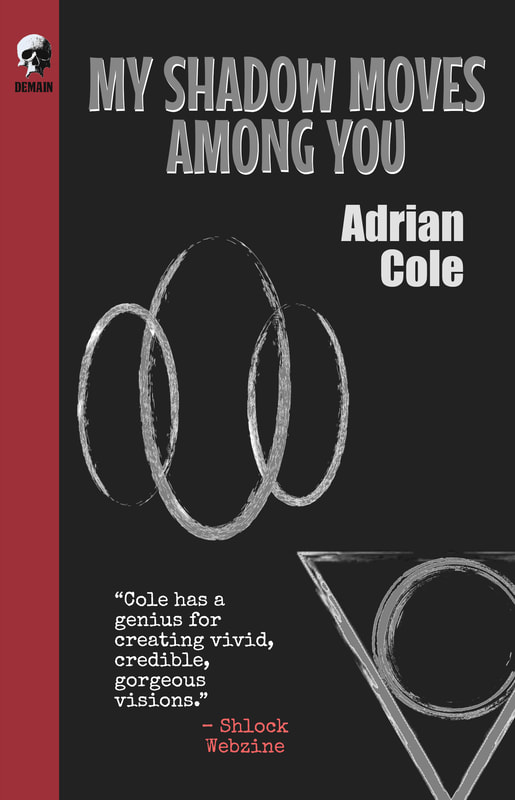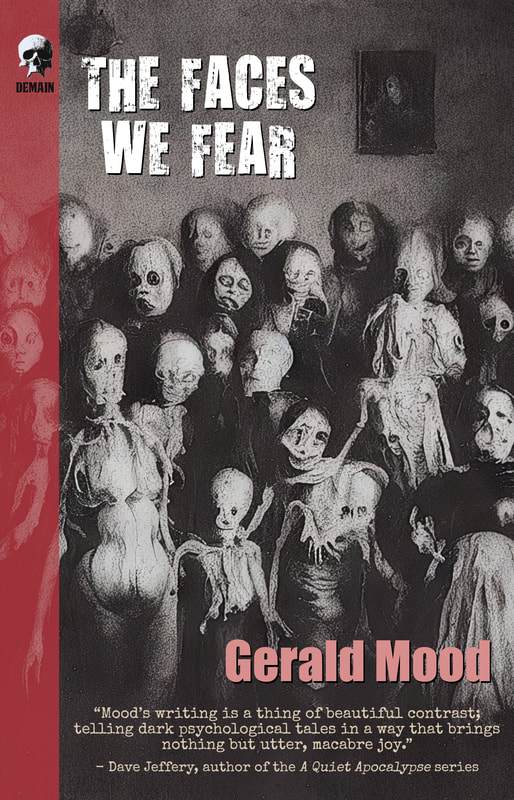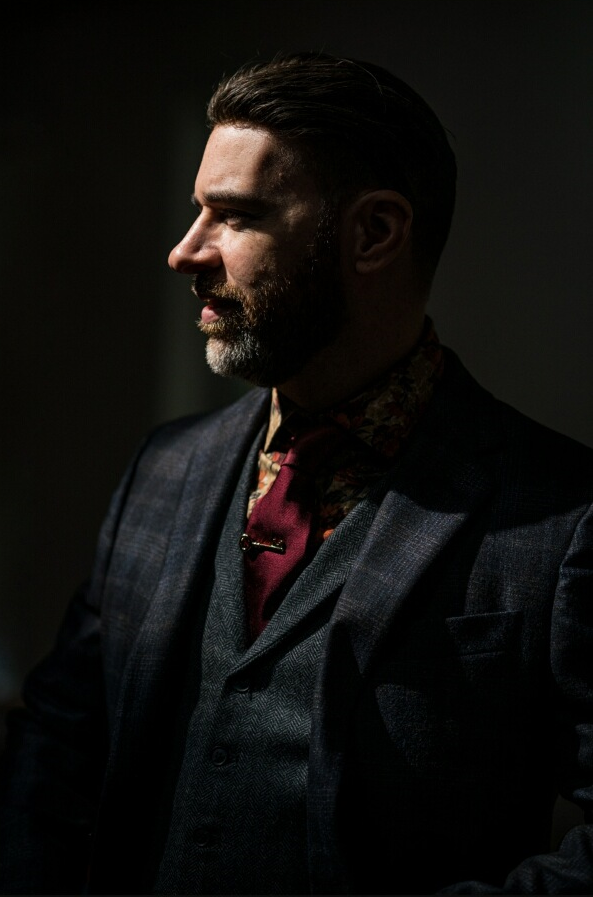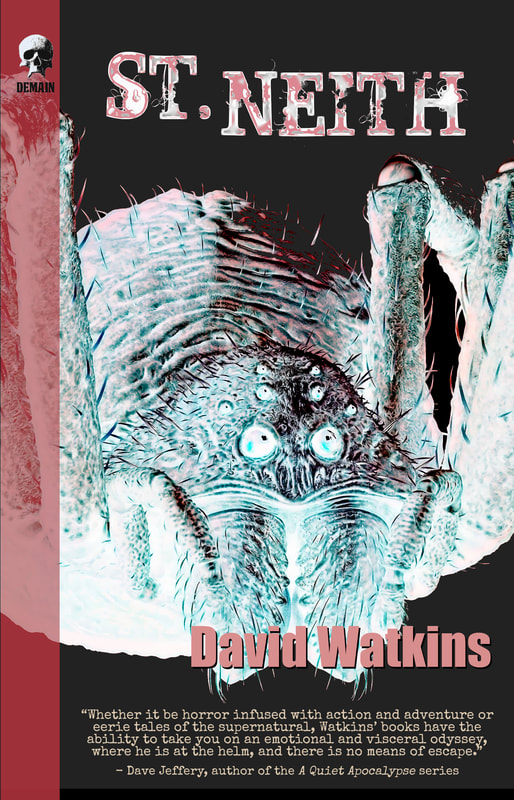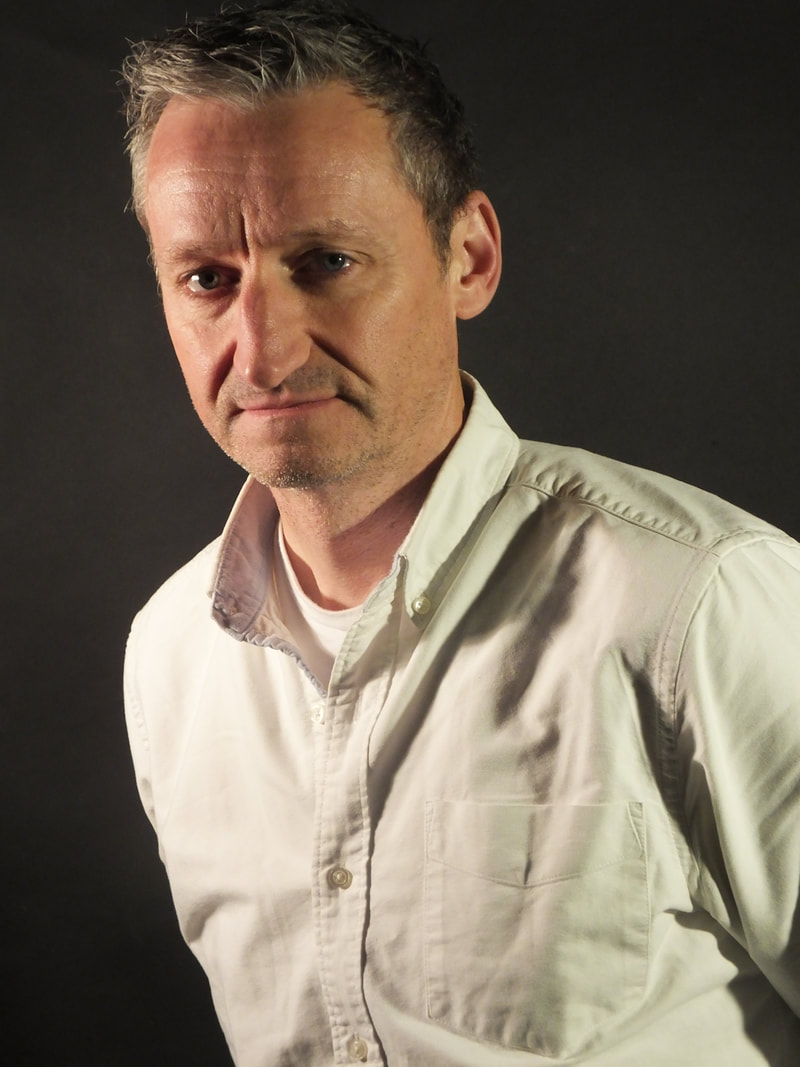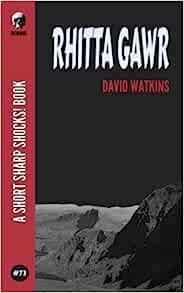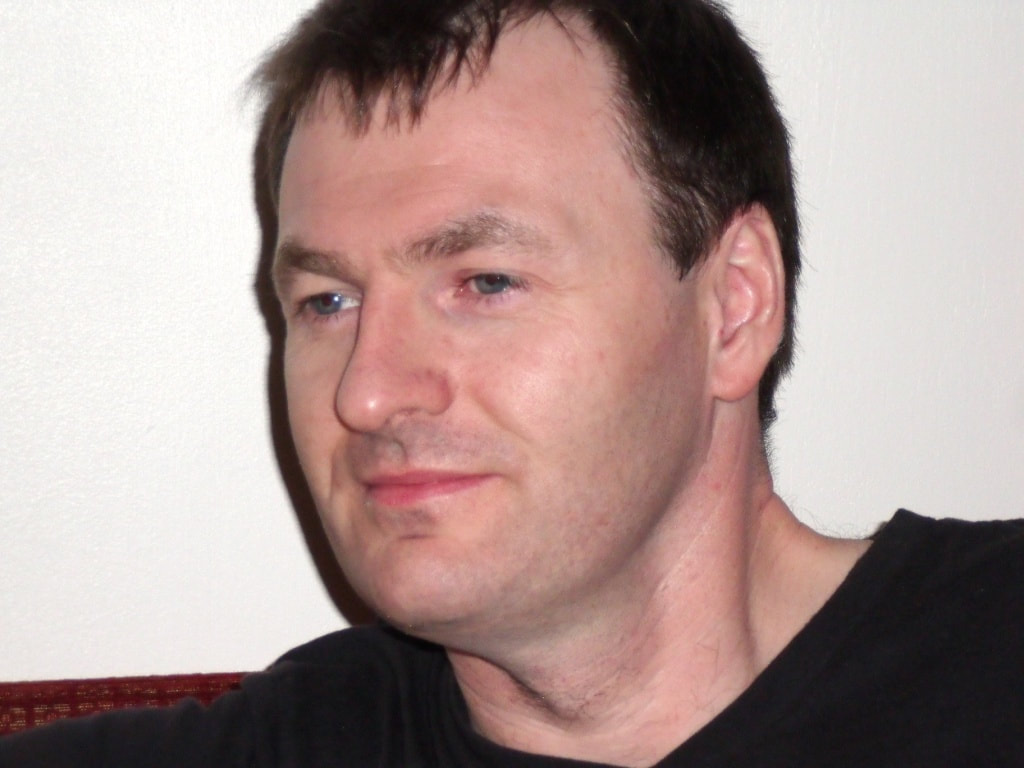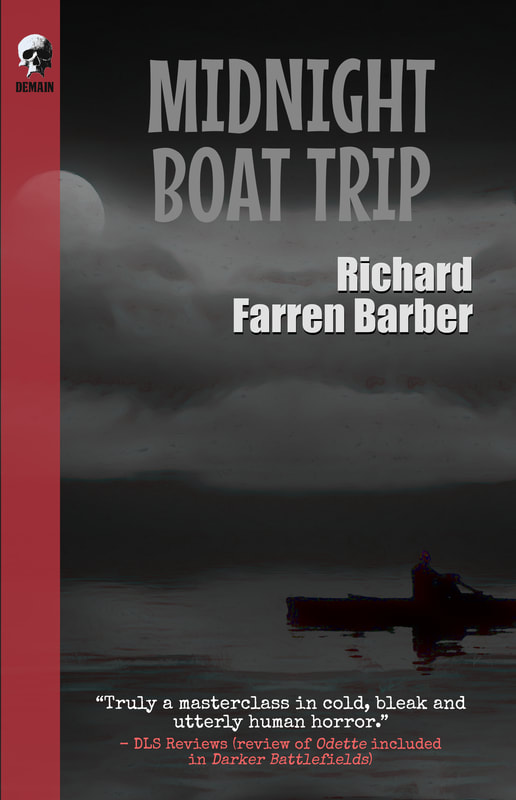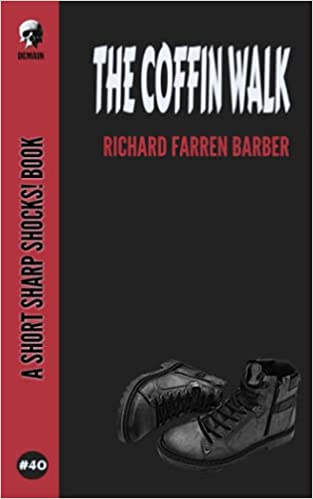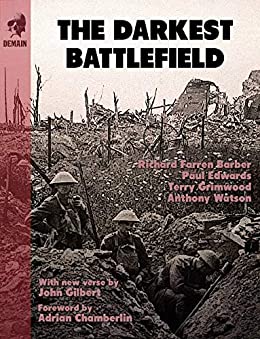|
|
|
And just as a reminder - right now we're closed to submissions across our all ranges, we're fully booked on releases for the next 18 months or so (which is exciting in itself) but keep an eye out because as soon as we can be open again, we will be !
0 Comments
Quick update to say that the DEMAIN website is being overhauled so apologies if it is down when you visit it - hopefully won't take too long - lots of exciting news coming on that front also ! Going to be a busy 18 months for sure - especially with the 'relaunch' of the Short Sharp Shocks ! series as we head into the final 25 titles...
Tuesday 30th April 2024 sees the publication of Micah Castle’s novelette, A Home In The Darkness (cover by Adrian Baldwin). Just before publication, Dean and Micah sat down and talked.
DEMAIN PUBLISHING: Welcome to DEMAIN Micah, happy to have you here. Let’s go for it, tell us all a little about yourself… MICAH CASTLE: I’m honestly a boring person. Most of my time is spent with my wife or writing, reading, taking care of our animals, weight lifting, and unfortunately [right now] looking for a day job. I’ve always wanted to write a book. It was a goal of mine for as long as I can remember, but it was one of things you say you want to do but just never do it. Well, sometime when I was 20-21 I said, “Fuck it” one day and began writing. I started taking it ‘seriously’ after my first short story sale in 2016. DP: Well done. Let’s take a step back and think about your early years and whether they influence(d) you as a writer… MC: My childhood and teenage years were okay, but could’ve been a whole lot worse. Mainly the former doesn’t really influence my writing. The latter definitely pops in and out in some stories, especially when it deals with those carefree years of fucking around and making dumb jokes with friends. DP: I assume that it was during those years you were first introduced to the horror/weird genre ? MC: My mother almost exclusively read Stephen King, so his books were all around the house, but my first horror series was Goosebumps back in the 90s. I didn’t read much in my teens, mainly non-fiction, but when my girlfriend (wife now) gifted me Necronomicon: The Best Weird Tales of H.P. Lovecraft, I was blown away by the stories. I didn’t know horror fiction could be written that way, and soon I discovered weird fiction and the rest is history. DP: And your novelette ? MC: A group of people wake up in a house they don’t remember how they got to, and quickly discover the house doesn’t care about the whims or wants of its occupants. Oh, and it’s not night outside. It is probably the most experimental and weird story that I’ve written, at least in longer form. DP: Again well done, we enjoyed reading it…did you have to do any research… MC: There wasn’t much research for A Home in the Darkness, but when something requires research, I typically just Google a bunch of things. If it’s anything very specific, I’ll sift through user comments in niche subreddits on Reddit. DP: Nice, nice – was it a difficult story to write ? MC: Yes, I knew where I wanted the story to go, but it was hard to finagle it into digestible form without it becoming too overwrought. DP: I hear you…so what is Micah Castle’s biggest success to date… MC: As of right now, it’s my debut novella, The World He Once Knew, published by Fedowar Press back in January. It’s a sci-fi horror story about a dead man’s conscience being bought and uploaded into an android-like body for the sole purpose of finding out what happened on a spaceship that’d gone dark two weeks prior. What he finds makes him wish he would’ve stayed dead. DP: Sounds interesting – will it add it to the TBR pile (and wish you continued success with it). Thinking about what you said [about Stephen King/HP Lovecraft] let’s talk about your other influences… MC: I read anything that interests me, so it’s not just weird fiction, horror, speculative fiction, etc. There’s far too many books and authors to name, but the reads I really enjoyed recently were: Only the Living are Lost by Simon Stranzas, Grasshands by Kyle Winkler, Sundown Towns: A Hidden Dimension of American Racism by James W. Loewen, Journey to the End of the Night by Louis-Ferdinand Céline, Lure by Tim McGregor, The Summer That Melted Everything by Tiffany McDaniel, The Treeline: The Last Forest and the Future of Life on Earth by Ben Rawlence, The Haunting of Velkwood by Gwendolyn Kiste, Dehiscent by Ashley Deng, and The Border Trilogy by Cormac McCarthy. DP: Some excellent titles there…with regards to horror/weird, what do those genres mean to you… MC: They’re both genres that can be utilized for just about any type of story someone would want to tell. It’s true for about every genre that the genre itself can be used for framing the story, so it doesn’t have to be straight horror, fantasy, sci-fi, etc. DP: So what do you think draws readers into them ? MC: Imagination and morbid curiosity, probably a little bit of fear, too. Readers are looking for anything that doesn’t relate to reality or does, or things familiar with their lives or things unfamiliar with their lives, or something realistic or something unrealistic. Really, there are thousands of different things readers are looking for in a story. DP: For sure…the world right now is quite a scary place (perhaps it always has been, it just seems right now we’re living in a ‘tipping point moment’) does that impact you as a creator [and do you put ‘world events’ in your work] ? MC: Usually, no, but recently I’ve used a thing that happens regularly nowadays in the States, not a specific event, for a book. There’s nothing wrong or bad about using real events, it’s just I prefer to make up fictional things to fit the story (also makes it easier to write, since not much, if at all, research needs done since it’s my own creation). DP: Nice. Okay, is there a particular book or film you’re looking forward to reading/watching… MC: I don’t keep up with movies, but the book I’m looking forward to is The Daughters War by Christopher Buehlman, the sequel to his dark fantasy novel The Blacktongue Thief. Another fantasy book I’ve been waiting for ages for is The Seven Sisters by Niel Giaman, which is also, a sequel to Neverwhere. I’m hoping for a new Susanna Clarke book in the near future, and I’d love for another Isaiah Coleridge novel from Laird Barron. DP: Great names…is there a new writer that perhaps interests you… MC: Unfortunately I don’t know what makes an author new or not. Some authors have been in the writing business for years and only broke out recently. I think authors like Scott J. Moses, Michael Wehunt, Kyle Winkler, Joe Koch, Corey Farrenkopf, etc. are going to become more well known (at least outside our little horror writer bubble) in the near future. DP: Great point ! And also that you’ve mentioned Joe Koch who has worked with DEMAIN in the past…I guess you wouldn’t agree then [as has been said] that horror is ‘dead’… MC: No, there’s more horror/fantasy than there ever has been. DP: So is there anything that Micah Castle is frightened of ? MC: Death and dying. I have thanatophobia, but not severely. I’d say death/dying plays a role in some way or another in almost all my longer works. DP: I hear you…creatively then, what else would you like to achieve… MC: Besides writing as many books as I humanely can, I’d like to learn to play the piano eventually. But until there’s more time in the day, that venture will stay on the backburner. DP: So writing is definitely a long-term career aspiration… MC: Writing is so integral to who I am I can’t imagine living without it, so I’ll be writing until I’m in my grave. DP: [Which hopefully is a long time yet] Do you interact with your readers… MC: I like talking to other readers as a reader more than an author, because at the end of the day we all love reading and books. All our interactions have been through social media, so unfortunately no funny stories to tell. I’ve spoken to several authors who’ve influenced my work through social media for no other reason than I enjoy their work. Luckily, so far, all of them have been welcoming and kind, even going so far to read my own work, which is still surreal to think about. DP: It certainly can be ! Okay, last question Micah…for those of your readers you haven’t yet connected with, is there something surprising about yourself that they’d love to hear… MC: I’ve run (and started) an underground metal, deathcore, death metal, metalcore, djent, etc., promotional entity for over a decade on the side called Pig Squeals & Breakdowns. I don’t do it as much as I used to since starting writing, but I still promote when and where I can (for instance, Enterprise Earth’s newest album Death: An Anthology is fantastic and you should listen to it). That’s definitely up my street so I’ll check it out. Micah, thanks for your time and best of luck with A Home In The Darkness. If you’d like to connect with Micah direct: Website: www.micahcastle.com Twitter: www.twitter.com/micah_castle Facebook: www.facebook.com/micahcastleauthor Insta: www.instagram.com/micahcastlewriter Patreon: www.patreon.com/micahcastle Just a reminder that here at DEMAIN we're always happy to work with legitimate reviewers so if you do run a blog, site etc etc and are interested in receiving titles from us then please hit us up at [email protected]. Many thanks !
Jan 31st sees the publication of Derek Muk’s novella Being Followed (cover by Adrian Baldwin). This is the first time Derek and DEMAIN have worked together. So not long before Christmas Dean and Derek sat down for a quick chat.
DEMAIN PUBLISHING: Hey Derek, hope you’re doing well. Okay, time is precious for us both obviously so let’s get to it, tell us a little about yourself. DEREK MUK: Hi! I’m Derek. I started writing back in high school. Back then, I belonged to a fiction writers club on campus. I found writing a fun, creative, constructive, and therapeutic way to express myself. I enjoy speculative fiction and movies and got my inspiration for writing from that. DP: So would you say those times have had some influence on you as a writer or did that come about later… DM: My professional background is in social work and I would say that’s had some impact on my work. Working with different people from all walks of life (different ethnicities, different socio-economic backgrounds, different religions, etc.) has really been a rich learning experience. You really learn about people and humanity. Working in the field has also provided inspiration and ideas for my writing. DP: I bet it has – so what was your first introduction to our genre? DM: When I started writing I was a fan of science fiction, horror, and mysteries. One of my first introductions was The Martian Chronicles by Ray Bradbury. I immediately read The Illustrated Man after that. DP: Ah I love Ray Bradbury so that’s very cool and The Illustrated Man is such a great collection of short stories – can’t believe that was written over seventy years ago now…wow…anyway, before I get all nostalgic/morose for the past, tell us about your novella… DM: Being Followed is a mix of urban, modern horror, mystery/suspense, and romance, with sort of a political bent to it. It was inspired by the last several years’ worth of news headlines and craziness in our world: the death of George Floyd, the feminist rights movement, the LGBTQ movement, and the January 6 storming/coup of the U.S. state capitol and the political divide in the United States. It was also inspired by 1980s and 1990s popular culture to a certain degree (actors/actresses, movies, music, and sports that I enjoy). DP: Yeap, it’s certainly been a crazy few years hasn’t it and sadly I think it’s going to be like that for a little while yet especially when we have elections coming up in the US, the UK and other EU countries…I guess you might not have had to do too much research for the novella because we’re living it… DM: [I did] Some. I read up on current events. DP: So what would you say is Derek Muk’s biggest creative success to date ? DM: The Hanging Man. DP: [For those that don’t know it, The Hanging Man was published in 2023 and is available on Amazon. The blurb reads: College fraternity alumni are mysteriously being killed off, one by one. Some say it’s the work of a ruthless, bloodthirsty psychopath seeking vengeance for a pledge hazing gone awry in the late 1970s. Others speculate that these events are tied to a curse. Professor Albert Taylor and his graduate teaching assistant, Jan, are no strangers to the weird and gruesome and start looking into things. Can they find out who is behind the grisly university murders before it’s too late?} So Derek what other books/authors are you reading right now ? DM: I enjoy horror, mysteries, thrillers, science fiction, young adult. Some of the authors that have inspired/influenced me are Stephen King, Joyce Carol Oates, Jhumpa Lahiri, Joe Hill, Robyn Harding, Max Tomlinson, Grady Hendrix, Harlan Ellison, Charlie Higson, Richard Matheson, John Lutz. DP: Some great names…what do you think draws readers into our genre? DM: I think some readers look for good scares and a solid story (a good escape) that keeps you turning pages. Others look for rich atmosphere and ambiance, setting, mood, emotion, character development and characters that you get invested in and care about. DP: Is there a book or film you’re looking forward to seeing… DM: Exorcist: Believer. DP: Haven’t managed to get around to seeing it myself yet but will check it out. With everything that’s happening in the world would you say that there isn’t a place for our genre and that fantasy/horror is over… DM: I disagree. The indie horror scene and mainstream horror appear to be thriving from what I read. DP: And creatively is there anything you haven’t managed to do just yet… DM: I’d like to try my hand at screenwriting someday. DP: Nice, so you see ‘writing’ as a long term or short term career (ie not moving into directing/producing etc etc). DM: Long term. DP: Great. SO last one Derek, do you interact with your readers… DM: Yes, I interact with readers (and writers, too) on social media. That’s great to hear. Well, all the best Derek with Being Followed. If you’d like to connect with Derek Muk direct: Website: https://theoccultfilesofalberttaylor.wordpress.com Twitter: https://twitter.com/DerekMuk Facebook: https://www.facebook.com/derek.muk.7 Friday 1st December 2023 sees the publication of Wolf World by Terry Grimwood. Terry is no stranger to DEMAIN and will be our third major publication of his – AXE and JOE are his previous titles. The book initially appears as an ebook, cover/design by Adrian Baldwin. As the nights drew in, Dean and Terry sat down to talk about it.
DEMAIN PUBLISHING: Great to chat again Terry. I know you’ve done a couple of interviews with us before BUT if you wouldn’t mind, let’s pretend we’ve never met: Terry Grimwood can you please tell us a little about yourself and how (maybe even why) you became a writer ? TERRY GRIMWOOD: [LAUGHING] Hello Dean, yes of course. I’m a country boy who grew up under the big skies of Suffolk and spent a lot of my childhood alone. I guess that’s why I developed a vivid imagination. I loved to lose myself on long walks deep into the countryside and soak up the landscape and landscape. I also became an avid reader, first of comics, the old-fashioned kind like Valiant and Buster, then those Commando war books and finally Westerns, before discovering science fiction. In those days, bookshop shelves were still groaned under the weight of novels and collections by Asimov, Heinlein, van Vogt and their ilk. In fact, some of them were still writing new stories. However, a new wave had hit, spearheaded by the likes of Ellison, Spinrad, Aldiss and Moorcock and by the time I was hooked on sf, the genre had matured into a more literary form. Then, of course, there was Star Trek, which had an enormous influence on my own youthful writing. I recently rewatched the original series and, startlingly, experienced that same sense of wonder that had swept me away when it was first shown on the BBC back in 1969. Here, at last, was real tv science fiction. Up until then we had made-do with programmes like Lost in Space (I was deeply in love with Marta Kristen [Judy Robinson], so I could forgive the ridiculous storylines), Doctor Who (never a fan) and the awful Land of the Giants. DP: I know what you mean about Lost In Space haha. I did like Doctor Who as a kid but not so much now. Also, was recently having a conversation about those old Commando books – loved them! So, I know you’ve mentioned a couple [of authors] already but talking about books, which ones influenced you would you say ? TG: Book-wise, my biggest influences are hard to pin down. Michael Moorcock’s heroic fantasy certainly inspired me to attempt my own juvenile epics, and my novella The Last Knight of Llanth (serialised in Trevor Denyer’s Legend magazine) owes an enormous debt to Moorcock’s flawed sword-and-sorcery heroes. Stylistically, John Steinbeck’s sublime The Grapes of Wrath, and Daphne du Maurier’s Rebecca brought me up short and showed me that there is a way to write that is more than simply telling a story. Clive Barker, showed me that monsters can be truly strange, alien and terrifying. Audrey Niffenegger’s The Time Traveller’s Wife and Her Fearful Symmetry, and Nina Allen’s The Rift and The Race all taught me that the strange can be a vehicle for emotionally powerful storytelling and inspired my, as-yet-unpublished novel, The Alone. I’m certain that I’m not alone in claiming Stephen King as an enormous influence and like so many writers fumbling their way into the horror genre, I emulated him shamelessly until I found my own rhythm. For example, my novel Axe is directly inspired by The Shining. DP: For sure, definitely saw those King inspirations in Axe. And as I get older (though I did study The Grapes Of Wrath at university) I certainly find myself tilting back to those old American masters such as Steinbeck, Faulkner, Hemingway etc…interesting…okay, so, Wolf World. TG: Wolf World has been stuffed into my mental Unwritten Stories Filing Cabinet since 1987. I dreamed up the basis of the plot during the same, lonely, dark and rainy car journey as the one in which I first encountered the idea for Axe. So, it is a very old story indeed. I’ve tried to write it several times but could never make it work, until, finally, it all came together a year or so ago, and almost wrote itself! As the title suggests, it’s a werewolf story, but, hopefully, an original take on the trope. The novella is, on one level, a straightforward supernatural thriller. On another, there is ambiguity. Where is the border between the two worlds visited by the reader? How much of the protagonist’s adventure is real and how much the manifestation of his unresolved personal trauma? Wolf World can be read as a Place story, or as a horror thriller that, hopefully has the reader on the edge of their seat. What, you cry, is the Place? It is a parallel universe visited in two previous novellas, The Places Between and Enuma Elis. Both are standalone stories, as is Wolf World. The Place underpins and reflects our world and is where protagonists find themselves as they attempt to resolve past and current trauma. It is different for everyone who finds themselves on the wrong side of its somewhat vaguely delineated borders. DP: I personally loved the fact that [as you say] a more original take on the trope, so well done ! I also think it’d make a great feature film…but we can talk about that in private. What would you say Terry is your biggest success thus far ? TG: Hard to measure. My novellas Joe, Skin For Skin and The Last Star have all been well received and that counts for a great deal for me. Of course, having my science fiction novella Interference nominated for a British Fantasy Society Best Novella Award was an amazing experience. Even though it didn’t win, I’m delighted to get into the final six. I’ll dine out on that for a long time to come! DP: Thoroughly deserved ! So what does horror mean to Terry Grimwood ? TG: Let’s return to that car journey mentioned earlier. In the winter or 1987/88, I was in the midst of an intensely difficult moment in my life. My children were being fostered, through a private arrangement with some friends of mine, to allow me to deal with my then wife’s illness. I had travelled some twenty miles to drop them off and was probably more distressed than I realised at the time. They came home after a few months, but that illness never went away and a few years later returned to beat both my wife and myself to a bloody pulp and bring tragedy in its foul, leathery wings. This is not self-pity. I’m trying to show how writing, and particularly writing in the horror genre, helped me through. It gave me an escape, yes, but it was also a mechanism by which I unconsciously explored, examined and even dealt with the trials, anger and bleakness around the situation I was in. I had a way of expressing my feelings. I could sort through the chaos, the mess, and give it structure. The monsters in my mind and soul could become “flesh and blood” demons which could be fought and sometimes defeated. It is said that dreams, bizarre as they might be, are the mind’s way of making sense of our recent memories and preoccupations. I think writing horror stories served the same purpose for me. The short stories I wrote at that time were eventually gathered into a collection called The Exaggerated Man. The book was reviewed by D. F. Lewis and it was he who picked out recurring themes that I realised were obvious links to what had happened during those years. DP: Terry thank you for telling us that – very much appreciated. And don’t worry I/we know you didn’t do it for self-pity and can totally understand your definition of horror, very personal…okay, let’s talk about a book or film you may be looking forward to ? TG: The Last Voyage of the Demeter. Radio Four once produced a superb play on the same subject; Dracula’s sea voyage to England and what happened on the ship. That and The Fall of the House of Usher series that has recently appeared on Netflix. Books; the rest of Simon Clark’s newly resurrected Blood Crazy series. Book one is out. Can’t wait for the rest. DP: I really enjoyed Usher so hope you do too. I would say then that as far as you’re concerned horror (as a genre) isn’t over ? TG: No. It’s certainly alive and well on the silver screen and there have been some excellent tv series; The Haunting of Hill House, Midnight Mass, The Haunting of Blyth Manor and Brand New Cherry Flavour, to mention but a few. There is something else. I attended the British Fantasy Society’s FantasyCon 2023 recently and was impressed at the upsurge in new members, and that the majority of them appeared to be young women. Not only are they readers and lovers of horror, fantasy and science fiction, but, at last, are making their presence felt on the book shelves. Superb authors such as Penny Jones, Eugene Bacon, Priya Sharma, Alison Littlewood, Lee Murray, Aliya Whitely, Susan York, Carole Johnstone and many, many more are revitalising the speculative and supernatural genres. They are taking their place in publishing too, Space Cat Press and Luna Press to name but two enterprises with women at the helm. More than this, most of the award winners in 2023 were women. That’s where the future lies and it is in very safe hands indeed. DP: Agreed and hope that the BFS does get itself back on its feet because in my opinion its had a bit of a rough few years – I guess it needs to make itself relevant again. I personally haven’t been able to attend FantasyCon for a couple of years but hopefully will return in 2024. Okay, last one Terry…can you tell us something surprising about yourself ? TG: Sure, I sing and play harmonica in the Ripsaw Blues Band… And on that note, Terry thank you so much for your time, all the best with Wolf World… If you’d like to connect with Terry direct: Facebook https://www.facebook.com/terry.grimwood.9 Ripsaw Blues Band - https://www.facebook.com/the.ripsaw.blues.band Here at DEMAIN we’ve been massive fans of Adrian Cole – as a writer and as a human being. Dean had worked with Adrian on an anthology a few years back (on a damn fine project called Demonology) and they were looking for another opportunity…his novella My Shadow Moves Among You (available as an ebook on November 30th – cover by Adrian Baldwin) has become that opportunity. Dean and Adrian sat down to chat and avoided talking football (Adrian being an ardent Plymouth Argyle fan and Dean, a supporter of (eventual hahaha) Premier League winners in 2024 Tottenham Hotspur [hope that doesn’t come back to bite me – Dean].
DEMAIN PUBLISHING: Great to see/speak to you again Adrian – it’s been a while since we’ve seen each other in the flesh – let’s raise a pint or two but first, let’s start with an easy one: Adrian Cole can you tell us a little about yourself and how you become a writer… ADRIAN COLE: Cheers, Dean! I began writing when I was 19 and sold my first novel(s) The Dream Lords, a Sword & Planet saga, after about 5 revisions, to Zebra Books in the States. Inspired by all the movies I saw as a kid and all the books I loved, such as ERB, Tolkien, Dune and more, I just loved the process of world building and writing. I had a ‘career’ that ended as a Business Manager in a large secondary college, but since retirement I have worked even harder at getting more published. DP: So your background- AC: I first worked as a Librarian, then did various stints as a casual gardener and worked in Education system, before being trained as a Manager(!!). Had a very full-on job in later years, culminating in helping to build a brand new, large secondary college. But my real love has always been writing. DP: Building a college – wow, well done bet that was both exhausting and rewarding. I know you’ve mentioned a couple already but was your first introduction to our genre? AC: Pan Books of Horror 1 and 2! Classics illustrated comics. And Dad took me to see the movie, Earth v the Flying Saucers [1956 – a great movie and would love to have seen that on the big screen]. I also became a huge fan of the ERB Martian and Venusian books. DP: Great great – so let’s turn our attention to your novella, My Shadow Moves Among You… AC: It was an idea that came to me out of nothing, centred on the four elements, and it grew in concept until, once I started it, I was being pulled along by its ideas. It can be classed as horror or fantasy, or both. I don’t always feel a need to fix securely on either, and some of my work, including My Shadow blends genres, not for effect, but simply to tell the story – I think it’s to do with an urge to open more doors and stray off the beaten track. I’m a country boy (born and bred in Devon) so maybe that has something to do with it. My Shadow starts relatively normally, but its protagonists find themselves embroiled in something deep and dark and ageless, powers rooted in their world that have gone unnoticed for a long time. DP: Personally I loved the way you did blend the genres – not everybody can pull it off but you did so well done. Let’s talk about research… AC: The story is based in my home area and slightly beyond it. Devon, Dartmoor specifically and the country, dealing as it does with elemental forces. So my whole life has been an experience set mostly in these places. I love the Moor and the surrounding mines and woodlands, etc. So my research has been mainly my experiences, and visiting places to get the feel of the atmosphere. Many of my other short stories are based in the South West. DP: I love it when authors write (and/or set their stories) about their local areas – for me it adds another level of interest/authenticity to the work. Did you find the story hard to write ? AC: No, but it has been through extensive edits. Initially it was much longer, but it was suggested to me that I cut it back and sharpen it up, which I did. I am one of those writers who enjoys the process of editing, so I would have spent 3 or 4 times as much editing as actually writing. I’d like to think the final version of My Shadow is all the better for it. DP: For my own writing process I’m finding it not particularly difficult to write the first draft BUT then that’s when it becomes a ‘difficult’ process as I labour over every word, then every sentence, paragraph etc etc. I’m obviously searching for something there…anyway, this is about you Adrian not me so let’s talk about your biggest success thus far. AC: I’m just putting the finishing touches to a trilogy of novels, a series called WAR ON ROME. These form a historical fantasy, set in an alternative Romano/Celtic world in which history as we know it takes a very divergent path. I did a huge amount of research for it, even though I have a good knowledge of the period. The titles are: Arminius, Germanicus and Boudica. Reviews for the first volume have been very encouraging, so I think I’ve got somewhere close to what I wanted. DP: This is great, I love historical fiction so can’t wait to dive in. Is there a new writer which interests you- AC: In recent years I’ve become absolutely fascinated by the wonderful Charlie Parker stories of John Connolly. What a talent! Far better than Stephen King, in my humble view. His characters are extremely well depicted and his plots, both immediate and stretching over the longer arc of books are terrific. To sustain the series for so long has been an outstanding achievement. DP: Ah, I love John’s work – sometimes takes me a little while to catch up on his new releases as my TBR is so high but yeah, hats off to him. What do you think of the state of our genre right now ? AC: I think book sales are well down on a few years back, but I’m sure there will always be room for horror and fantasy, or a blend. Horror has become in many cases subsumed by crime. I think horror movies are booming again, so these things tend to go up and down. I can’t see them ever being truly dead...dormant in some cases, but never more than that. And I guess that other forms of entertainment, such as gaming, have become extremely popular, probably to the detriment of book sales. DP: True, true…talking of different genres/mediums – is there [creatively] something you haven’t done yet which you’d like to nail at some point soon ? AC: A film! My work is very visual. War On Rome would make a fabulous tv series, and I think My Shadow could easily be turned into a series. I’d absolutely love that ! DP: Well, we never know what’s around the corner ! But good luck. Okay, last one – can you tell us something your readers might be surprised to find out about Adrian Cole ? AC: I’m coming up to 75 next year and still spend a lot of time in the sea and surf! (Some of it has rubbed off on my Elak of Atlantis cycle of stories.) Haha wish I was there enjoying that. Great to chat with you again my friend – let’s not leave it so long next time. Best of luck with My Shadow Walks Among You. If you’d like to connect with Adrian direct check him out on Facebook. July 7th sees the publication of Gerald Mood’s horror collection, The Faces We Fear (with a cover by Adrian Baldwin and central art-piece by Dark Artist Roberto Segate). Gerald is new to DEMAIN but came highly recommended by Dave Jeffery (author of the A Quiet Apocalypse series amongst many others and our good friend) so when Gerald’s manuscript landed in the DEMAIN in-box it was already highly anticipated. A month or so prior to publication Dean and Gerald talked all things scary…
DEMAIN PUBLISHING: Hello Gerald, great to talk to you – welcome to DEMAIN. So, tell us a little about you… GERALD MOOD: Hello! And thank you…I’d be happy to introduce myself. I was born and raised in Delaware, USA, which is the second-smallest state in the country. I’m an Environmental Scientist for a living, where I help prevent hazardous air pollutants, particulate matter, and other dangerous airborne emissions from entering our atmosphere. I started writing as a young teen using roleplaying games, like Dungeons and Dragons, as a vehicle for my adventures. Initially, I was a player, but I discovered very quickly that I liked being the narrator even more. Creating the drama and impetuses for conflict in a way that would celebrate my players was very satisfying for me. In fact, I still reminiscence with my friends over their old characters and the trials and tribulations that they went through. Those experiences and memories are held very dear to them, even to this day. Listening to them fondly [I still] remember those adventures I crafted years ago has had a tremendous impact on me. I want to do that for a larger audience. DP: Nice one, sadly I was never really into D&D and all that – no real reason I guess, maybe I just didn’t know others who were into it. I do remember trying to play it one drunken night at Towson State but enough said about that the better (and now I do have some friends who are well into it perhaps I need to give it another go) – anyway, so your background and did that have some influence on you as a writer… GM: Something I didn’t know about myself until I was a young adult is that I’m compelled to create. When I entered university, I began studying Biology. Three years in, I had reached my limit and thought about dropping out. It forced me to really take stock of what I enjoyed. I remembered all those fond memories that I had crafting RPG adventures for my friends, and wondered if I could somehow do that for a living. When I brought up to my academic advisor the idea of switching my major to English Literature, she laughed; I was three-quarters of the way to a Bachelors of Science. In an effort to help keep me on track, she suggested I double major. It was brilliant. While I could have written-off my science degree while job hunting for a more creative career, the distinct nature of my education allows me to work full-time using the technical and analytical side of my brain while saving up my creative energy to pursue writing fiction when I’m not working. If I was spending my creativity on my day job, it’d be much harder for me to work on my personal projects after hours, and I most likely wouldn’t be here. DP: Fair play to your academic advisor then and by the sounds of it yes you were able to have the best of both worlds. At college I double majored in history (American/World History - focusing on Revolutions) so all my creative stuff was done outside of my studies which worked for me. I started writing stories for the college magazine which I then discovered were being discussed (positively I will add) by one of the English tutors to his classes– when I heard about this I should have spoken to him about it as he may have been able to guide me and it would have been fun to talk to others about my creative process at that time (which hasn’t changed too much – lots of booze haha) but I didn’t…our college also offered a couple of writing prizes but I never went in for them either…again a bit of a missed opportunity now I look back at it. I’ve always wanted to do a Masters at some point so perhaps I’ll try and right those wrongs…anyway, before I get lost down memory lane I have to remember this interview is about you, not me (though of course Dear Reader I am available for interviews hahaha) – what was your first introduction to the genre… GM: I think my first introduction to Fantasy was the movie Willow. Everything–from the late 80’s special effects, to the characters and storyline–was unlike anything I’d ever seen before. I remember thinking Madmartigan, played by Val Kilmer, was the coolest person I’d ever seen. Regarding Horror, I remember reading Vampire of the Mists by Christie Golden, and being blown away by the duality of its characters and the severity of their moral consequences. They were horrific and beautiful at the same time. I think that’s what made the biggest impression upon me. DP: I haven’t heard of Vampire of the Mists before so will check it out. I’m not a great fan of Willow personally (but I’m glad it resonates with people even today!) but Val Kilmer I adore [and if you haven’t I thoroughly recommend you check out the recent documentary about him called Val]. So now we’re a couple of questions in, let’s talk your collection… GM: I hope they’re cautionary tales. Stories about characters who want something so badly, they’ll go to extraordinary lengths to obtain them. Lengths that make them monsters. Having said that, regardless of what they’ve done, no one is beyond redemption. My stories are about taking my characters to some of the worst possible places, and then attempting to bring them back into the light. Ultimately, it’s for the reader to decide whether or not they’ve redeemed themselves. DP: I like it – so in that regard did you find the stories hard to write… GM: Oh, definitely. Some of it was uncomfortable. A few of my stories travel to some pretty dark places. Realizing what has been done, coupled with how things are dealt with, was difficult. I try to be very sensitive and thoughtful though, because I understand I’m taking my readers along on this journey with me. DP: Well I for one think you’ve been very successful, so well done! Okay, I’ll throw this out there – what has been your biggest creative success to date? GM: You mean aside from this, my first time being published? I’d have to say it’s my yet-to-be published novella, The Sea Under the Mountain. It’s a Lovecraftian tale surrounding a doctor and her investigation into a long list of strange maladies plaguing the fictitious village of Prism, Alaska. What makes it my biggest success is that it’s not only my longest piece to date, but it’s also proof to myself that I can write a manuscript of admirable length. Having accomplished that, I’ve outlined a full-length novel, and I now know I’m unequivocally up to the task of writing it. DP: Good luck with the novel for sure. I promised myself I’d write my long planned one a couple of years back and the covid struck and I ended up writing other shorter stuff and now as well as DEMAIN I’ve got my film company (with Sharon Axcell) called DrAx Productions BUT I’m going to put some time aside, find myself a little place in either Paris or Marseille [Lordy that sounded pretentious didn’t it] and write the damn thing…so what does horror/fantasy mean to you? GM: Initially, it was hunting literal monsters in an imaginary setting. Very black and white. It meant saving the damsel in distress. David versus Goliath. Slaying the dragon. Now, it’s more of a gradient. Nothing is completely good, or completely evil. Discovering that threshold for each character is intriguing, while evoking an emotional response is what keeps us revisiting those stories in our minds. They can be cautionary tales, or ways to experience the Otherworldly. Sometimes, both. Whether it’s a way for us to observe behavior we don’t expect or wouldn’t want to come across in real life, or a fresh perspective to challenge us and how we perceive the world, it's what allows us to reflect on life from a safe distance. DP: I like that and you’re so right about nothing being completely good/completely evil and sometimes it does come down to perception (there’s a meme/gif you maybe aware of – based on a sketch in a UK comedy show called Mitchell and Webb - where one Nazi officer says to another “Are we the bad guys?” – which whilst funny in its own context is also quite profound…). For Gerald Mood is writing a long-term career… GM: I’d have to say it’s a long-term endeavor. Whether I continue to be published or not remains to be seen, but I can’t stop writing stories. While I view writing as a positive and enjoyable activity, it’s also very cathartic for me. I used to call it, “getting the poison out.” Sometimes, when I don’t have the energy to sit down and formally write, I’ll have my characters tell me a story, usually by asking them where they go or what they do, and then watching them in my mind as they go about doing those things. When they interact with another character or situation where they don’t have any control, I’ll roll a die to see what happens. It’s incredibly entertaining, albeit quite solitary. Of course, before I met my wife, being alone was one of my favorite places to be! DP: Keep at it is my advice – you’ll have good days and you’ll have bad days but keep on going! Okay, I’ve enjoyed this but don’t want to take up too much more of your time so last one: what is something your readers might be surprised to find out about you? GM: I’m on YouTube co-hosting the first fourteen episodes or so of a show called Digitally Distracted. We talked about retro (80s and 90s) topics related to video games, movies, and technology. I’ve also acted in a short-lived YouTube sitcom called Looking for Love by the same content creator. It’s shot in a mockumentary style, à la The Office, and follows the trials of a naive divorcé looking for love in modern times. I ended up playing the character’s best friend. I think some of the episodes are still floating around out there. DP: Wow – will check them out immediately. Great to chat with you Gerald – all the best with The Faces We Fear. If you’d like to connect with Gerald directly: Website Address: www.geraldmood.com Facebook Address: https://www.facebook.com/geraldmoodauthor Twitter Address: https://twitter.com/geraldmood Instagram Address: https://www.instagram.com/gerald_mood/ July 7th sees the publication of David Watkins’ novella St Neith. David is no stranger to DEMAIN with his previous Short! Sharp! Shocks! title Rhitta Gawr. Both covers are by Adrian Baldwin. St Neith is now available for pre-sales. Late May, Dean and David sat down and talked about the (horrible – but in a good way !) new release…
DEMAIN PUBLISHING: Hello David, it’s great to speak to you again. So I appreciate this is a busy time for you so let’s get down to it… DAVID WATKINS: Hello Dean and to those that don’t know me, I’m David Watkins – Dave to my friends. I’m a maths teacher as my day job, running a team of maths teachers in a small secondary school in North Devon. I’ve written for as long as I can remember and had a five-year plan when I became a teacher: write in the holidays, then give it up and bask in the glory of being an international best seller. I’m still appalled at how naïve (and arrogant) I was. I have been a teacher for 28 years now and have learned to fit my writing in around the day job. I set myself a low word count (500 words per session) so that every time I sit down to write, I hit my target and feel like I’ve made progress. If you go to any writing forum or twitter, there seems to be a lot of competition around word counts and it can be very intimidating. My tip to anyone starting out would be to ignore that and set your own goal. If you are beating yourself up because you didn’t hit 4000 words today, then you’re not giving yourself room to improve as a writer and kind of missing the point. The only thing that counts is ‘bum on seat’ and actually writing. Who knows if the people who say they’ve written 10,000 words today a) actually have and b) write anything at all for the next week. Writing is a bit like going to the gym: consistency is the only way to see real results. All writers know someone who says: ‘I want to be a writer’, and then say they don’t have the time. These same people can also tell you the intricate plots of at least five tv shows they are watching – why not make it four and use the time you just gained to write? The world is full of distractions, but to write you need to carve out the time – no-one else is going to do it for you. DP: You’ve made some cracking points there and I definitely agree about setting your own goals and keeping to them. Right now I’m personally involved in a couple of projects (stories and scripts) so I’ve got to stay disciplined…I think (though of course I may be wrong) it was Stephen King who said about not worrying if you finish mid-sentence either and in fact that was better if you did because it got you straight in the zone the next day and I’ve tried my best to stick to that…so tell us about your background and whether that has had some influence on you as a writer… DW: I grew up in South Wales in the 70s and 80s, when mining was at its height. I lost my grandfather when I was about four. He died of emphysema, brought on by being a miner. My mother always said she would never allow her children to go into the pits and she pushed me, my brother and sister to do well at school. Obviously, Maggie (Margaret Thatcher – ex British Prime Minister and awful, awful human being) came along at that time and so the mines weren’t an option anyway. From there, I lived and taught in London and then moved to Devon where I now live. I find the open spaces of Dartmoor contrasting with the closed, dark spaces of woods and forests to be inspirational for writing horror! DP: I bet ! I love when writers talk about how the landscapes around them influence them/their work. When I’m in France as much as I love the hustle/bustle of Paris (and it does inspire me don’t get me wrong) I do love sitting by the sea in either Cannes or Marseille with a glass of wine [okay more than a glass] a new pen and notebook and it only takes a couple of sips before the words start flowing…anyway, enough about me – what was your first introduction to the horror genre. DW: The first horror book I really remember reading was Christine by Stephen King. I know it’s a cliché that a modern horror writer was influenced by King, but there is a reason for that. It’s easy to bash him these days, and in certain Facebook reading groups, it’s almost a daily sport, but I think he’s superb. His characterisation is second to none, and is the main reason for his success, I think. From King, it was a short step to James Herbert, Ramsey Campbell and then Clive Barker. The ‘80s horror boom produced a lot of work that was not very good and existed just to shock or gross you out, but there were also many gems from that period and beyond. Anyone interested in that period should also check out Christopher Fowler and Mark Morris in addition to those mentioned above. Ramsey Campbell is still churning out high quality work too, and I am in awe of that. Lovely fella too. DP: Yes, I’ve said elsewhere I need to be reading more Ramsey – he is a great writer and encourager. I love Clive but you’re right too about the late Chris Fowler – I was lucky to work with him on a project and have had a few drinks/chats with him in the past. He’s sadly missed already. I personally don’t know Mark as well as I probably should and haven’t read too much of his recent work but those early ones – well up my street ! So, let’s talk your novella… DW: Two teenagers are enjoying a slice of freedom by exploring their local woods. Unfortunately, there’s something living there now and it’s hungry…. To say more would veer into spoiler territory, and given it’s a short story, I don’t want to give anything away. DP: Haha that’s so true (and hopefully we haven’t ruined it with the cover but it does work so well) ! Okay we’ll move swiftly on – in writing St. Neith did you have to do much research… DW: No research, beyond some anatomical stuff for the bad guy (check the cover out for an idea…). It has scarred me, seeing close up photos of those things. Urgh. I did have a sensitivity reader also, to make sure I got the teenagers right. Luckily, as I work in a school there were plenty to hand. DP: Oh nice one – hope you didn’t scare those teenagers though hahaha. What would you say is David Watkins’ biggest creative success thus far ? DW: I was blown away by the response to The Exeter Incident. I thought I’d written a dumb action thriller with added monsters, but the reviews have been absolutely stellar for it. Currently sitting at a solid 4.8* on Amazon, with rave reviews from websites such as Gingernuts of Horror, Happy Goat Horror and GBHBL. Tim Lebbon said, “Great monsters and dynamic characters make this brutal, bloody, brilliant novel an essential read.” That meant the world to me as I admire him as writer and his career is inspirational. He’s written in the Star Wars, Alien and Predator universes! I would love to do that. DP: Tim’s a great guy for sure and love his work. And congrats on the reviews/comments about The Exeter Incident – thoroughly deserved. What does horror mean to you ? DW: This is a great question! I have been having this exact discussion with many of my friends for a while. Most of them are adamant they don’t like horror, which lead to a discussion of what horror is. One of my friends said she didn’t think A Quiet Place was horror. I was quite shocked by that – what the hell do you think it is then? My wife’s book group read a lot of psychological thrillers, but they won’t read horror. I find that a bit weird to be honest, as some of those thrillers come from a very dark place. There’s a Harry Hole novel (by Jo Nesbo) where the murderer keeps his victim in his waterbed and sleeps on her every night. Jesus, Jo, that’s really messed up! See, that’s horror to me, far more than monsters like vampires or werewolves, because it could happen. My wife also has a definition of horror that essentially means ‘otherworldy’, as in there has to be something fantastical or monstrous about it. Something that doesn’t exist in the real world. I’m not sure I agree, but I can see where she’s coming from. I suspect that for far too many people, horror means blood, guts and gore. Whilst all that definitely has its place, horror is so much more than that to me. If anyone thinks horror can’t be literary or well written, I would point them to Priya Sharma or Adam Nevill. Funny? Try Kit Power. Heart breaking? Um, Kit again and Dave Jeffery – particularly with the A Quiet Apocalypse series (published by DEMAIN, so I hope that doesn’t look like I’m sucking up!). Unnerving? Try CC Adams. Beautiful characters that horrible things happen to? Try Phil Sloman or Laura Mauro. DP: Some great names there and happy to say that either DEMAIN or myself personally have worked with Dave, CC and Phil. Have read Adam’s books and he too is a great guy – very friendly/approachable. Yes I have an ‘issue’ sometimes with readers who love the grisly aspects of those thriller type books but if you slapped ‘horror’ on them suddenly they turn their noses up – it’s all about perception I suppose. And yes, I do also believe that A Quiet Place is horror ! Thinking of this then, what do you think brings readers into our genre… DW: Another great question. I wouldn’t presume to speak for all readers, so this is my personal response. I look for escapism, first and foremost, but that has to be tied to good characters and a driving plot. If you’re going to write about vampires or werewolves, do something different. If you can’t do that, make me care. DP: I’m loving this – so I keep being told the genre (horror/fantasy) is dead… DW: No, definitely not. For fantasy, just take a look at Brandon Sanderson’s recent Kickstarter. He made over $40 million, with more than 180 thousand backers. It was the most successful Kickstarter in the history of the site. That’s before we talk about Game of Thrones and the countless attempts to cash in on that (eg World Of Time, Rings Of Power). I think there’s a huge appetite for genre writing. For horror, there are so many great writers currently turning in high quality work that I firmly believe it won’t be long before it occupies more than a single shelf in Waterstones or your local bookstore. And it won’t just be King either. DP: You’re 100% right – we need to get the stores stocking horror again ! Okay, so without guessing this – what scares Dave Watkins ? DW: Heh heh, spiders. Hate them. Really, passionately despise the freakish things. It’s the way they move, and the speed those limbs propel them forward. Never trust anything with more limbs than you. Write about them? Yep, I’ve done that. The Original’s series I’ve written features spiders, which is just one reason my mother didn’t make it past the opening chapter. In fairness, the death and destruction would have seen her off too. Sorry mum. St Neith, my latest novella, takes its name from the Egyptian Goddess Neith, was associated with spiders as a result of her weaving the strands of destiny and the world. DP: I didn’t know that until I did a bit of research before reading the novella (which perhaps I shouldn’t have) but I loved that you did that…okay, I said I wouldn’t take up too much of your time so a couple of quick ones: creatively is there anything you’d like to do that you haven’t done yet? DW: Make a film of one of my books. I recognise it would be stupidly expensive, but I’d love to see Carter and Kingston from The Exeter Incident or Jack and Knowles from The Original’s Return on the big screen. DP: Well, you never know what is around the corner…so last one: what is something your readers might be surprised to find out about you? DW: I once got kicked out, and barred, from the same nightclub twice in one night. It’s a stupid story, so if you’re reading this and want to know more, ask me in person. Buy me a pint first though. And I just might Dave ! Thanks so much for your time – enjoyed that – hope to see you in real life again soon. If you’d like to connect with David Watkins: Website: www.david-watkins.com Twitter: @joshfishkins Amazon Author page: http://author.to/DavidWatkins Instagram: @david.watkins.writer (hugely original, I know…) April 28th sees the publication of Richard Farren Barber’s new novella Midnight Boat Trip (cover by Adrian Baldwin). Richard has worked with DEMAIN previously (including the Short! Sharp! Shocks! The Coffin Walk) so it was a pleasure to sit down with him again and talk…
DEMAIN PUBLISHING: Hi Richard – great to speak to you once more. I know I’ve asked some of these questions before but let’s pretend we’ve never met: can you tell us a bit about yourself and why you became a writer… RICHARD FARREN BARBER: Of course (and great to speak to you too). I’m Richard. I grew up with a love of books; I have a clear memory from primary school where we would walk down to the local public library in Hyson Green, Nottingham (A fantastic old Victorian building) to be allowed to pick/return books. I can even remember picking up my first Doctor Who book there (I don’t remember the exact title, but it was by Terence Dicks and it starred the Daleks) and then ploughing through the series. And I suppose that’s why I became a writer; because I loved reading. I loved pouring myself into a book and entering a different world. I see writing as an extension of that experience. When I’m writing I am immersed in the story and that thrill of the first draft, where I’m watching the story unfold at my fingertips, is intoxicating. DP: Definitely agree with that. So what’s your background and do you think that has had some influence on you as a creative ? RFB: I’m second generation Irish, which I do think has an influence. As a kid we went back “home” every second year and now I go back to Ireland most years. I think the mix of rural and urban and the mythology and sense of place and connection is something which crops up in my writing; either directly in the case of some of my stories which are set in Ireland, or indirectly in terms of the sense of spirituality. DP: I’ve never been to Ireland but an opportunity is presenting itself as we speak [I’m working on a film project with an actor from Kerry], so I’m hoping that this year I can get over there…what would you say was your first introduction to the horror genre ? RFB I suspect I share a kinship with a lot of UK readers who grew up in the 70s/80s: Doctor Who and Robert Westall. I had to read The Machine Gunners by Robert Westall in English class when I was about 12 and after that I just devoured everything I could get by him. Highlights included The Devil on the Road, The Scarecrows, and Futuretrack 5; which is up there in my favourite books. After that I took a detour into Pan and Fontana horror collections, but I don’t think I really read a “proper” horror novel written for adults until I was at university and picked up Stephen King’s The Dead Zone. After that I spent a year or two trawling the bookstalls of London trying to find cheap second hand copies of anything and everything. DP: And your novella… RFB: Midnight Boat Trip has a slight nod in the title to Clive Barker’s Midnight Meat Train, but that’s the end of any connection. A trio of children sneak out of their holiday home to take a boat onto the lake at night for an adventure. After the typical sibling arguments, the family finally comes together when they hear someone knocking on the underside of their boat. Although unnamed, the setting is Canada and the story has its origin in a family holiday to the Rockies. We stayed in a lodge beside a lake (Not Pyramid Lake, though!) There were elk wandering between the houses and we spotted a bear on the road up from the site. It was wild, in the true sense of the word. The tale itself is based on two ideas which clashed together and went off somewhere new. The first was the boat trip across the lake, which did happen, including our family arguing about how you were supposed to row a boat. The second was a story I read in the site’s reception that the nearby lake had been used by the military in the second world war. There was a secret project to build aircraft carriers using a mixture of woodpulp and ice, and they tested it on the lake. The project was not a roaring success, which you might have been able to work out from the fact the last ferry you took probably did not look like a length of sweaty MDF. The prototype sank. Switch boat to plane, and the suggestion that there was something under the water, and I was off! DP: That premise (or perhaps that should be those premises) is a real hook. I personally enjoyed reading the story so well done. So I’m assuming you had to do a lot of research ? RFB: I’m very bad at research. Or I research badly…I’m not sure which. In truth, I worry I’ll get so bogged down in finding out the facts that I won’t find room for fiction. So…I tend to write and then do very targeted research to try and ensure anything which needs to be accurate, is accurate. I suspect that my very strategic research is probably guilty of generating all manner of inaccuracies in my stories, and I apologise to anyone and everyone who has read something and felt a pang of physical pain when they spot something wrong. DP: And creatively what would you say was your biggest success to date ? RFB: I think in terms of my most successful piece of writing, ever, based on the number of readers, it would have to be the name and tag line I came up with for my brother’s window repair company: Assprin – For all your window panes. But that feels a bit sad, really. So in terms of my fictional writing, it’s probably the last novella I had published, by Crystal Lake Publishing: Twenty Years Dead. Dave returns to his father’s grave to witness his Rising exactly twenty years after he died. That one sold reasonably well, and I was happy with how it came out. I’m currently juggling half-a-dozen different projects (I know, I really ought to focus!) and a few of them are particularly dear to me. DP: I read Twenty Years Dead and really enjoyed it so well done and to be honest I love that tagline and it made me chuckle ! And there’s nothing wrong with juggling projects in my opinion – you should see my ‘writing board’ full of stories, novellas, scripts which need completing – the life of a writer hey ! Tell us about the books/authors that you like and/or influence you ? RFB: I tend to read across the piece; horror, science fiction, fantasy, crime, thriller, literary fiction. In a quiet moment last year I worked out that if I didn’t buy any more books, the unread books already on my Kindle would last me through the next ten years. Reader, I have bought more books since then! In terms of authors, my “go to” list is Stephen King, John Steinbeck and Robert Westall, but there is a great wealth of talent both inside the horror genre and beyond. Names that spring to mind include Ramsey Campbell, Michelle Paver, Adam Nevill, Neil Gaiman, Paul Tremblay and Sarah Pinborough (The Death House is awesome!!!). But there are just so many great stories out there. As well as the mainstream I read a lot of Independent Press with authors such as Simon Bestwick, Peter Mark May, Mark West, Mercedes M. Yardley, and Dave Jeffery. I would really need to pull up my list of books read from Goodreads to give a proper account of my reading habits, I’ve missed a large number of great authors (even as I’m saying this more names are popping to mind, but I could spend much of the day creating a list!) In terms of influence, I think everyone is influenced to some degree by what they read. My early writing read like very bad Stephen King, but hopefully I’ve got beyond that. Sometimes I will be reading something and notice the impact it’s on me having and try to work out what the writer is doing to achieve that effect. Sometimes I’ll spot a particular trick and consider whether I can (and should) incorporate it into something I’m writing. Perhaps the most direct influence, though, is when I read something and it sets off an image or an idea in my head. The author usually goes in a different direction but the idea stays with me like a seed waiting to germinate. Perfect Darkness, Perfect Silence came about in that way. It was from a single image in a Tim Lebbon novel in which someone was dumping a body overboard. DP: That’s great that you (like me) can be influenced by a simple single image – I love the way the brain (and creativity) works – it’s such a blessing. What would you say horror means to you ? RFB: I have two answers! Firstly, horror is an emotion. It’s a visceral response to what is usually a sense of danger. But for me as an art form (and there’s a danger I’ll trip over into pretension here, so hold onto my hand and haul me back if I go too far) horror is able to reflect on the core questions of humanity: why are we here? What is important to us? Is there anything else? I love the fact that in a horror novel you can be dealing with the surface of “the monster” but then you can peel back to what that means for the characters and by extension, what it means for us as individuals. DP: So true and very profound – love it. With this in mind then what do you think draws readers into the genre… RFB: For me, horror offers something which no other genre really touches: What is life all about? What happens next? A lot of horror deals with the interface between life and death and the possibility of moving between those two worlds. I think horror fiction gives you the thrill and the jolt, but personally I think a great horror novel leaves something behind once the reader has finished. A suggestion. A hint. The possibility that it might not all be over when the nails are hammered into the coffin lid. DP: Which to some extent I believe we’re all hoping for. Thinking about what you’ve said would you agree that the horror genre is affected by world events… RFB: There’s a school of thought that when real life is dire, people turn to horror fiction as a way to process the horror. I’m not convinced by the theory, otherwise the horror genre would be permanently booming. In terms of adding world events into my stories, I do tend to drop in occasional references to events. Most recently I was considering what to do about the Covid-19 pandemic. It felt strange just to ignore it, but also I think there’s a real sensitivity when you’re dealing with history, and especially recent history in which millions of people died. DP: It’s slightly weird as we were expecting a glut of Covid related subs at DEMAIN but that hasn’t happened – I guess it is still raw for a lot of people. Is there a new writer (or director) that currently interests you ? RFB: I think one of the challenges with naming new writers is that in many cases, by the time they are reasonably successful they’re not new... they’ve been honing their craft for years. So I’m going to sidestep that particular conundrum and go for two writers who are reasonably new to me: Chuck Wendig and Grady Hendrix. See what I mean? Chuck’s debut novel came out 12 years ago while Grady’s Horrorstor in 9 years old. Not exactly Jordan Knight and Mark Wahlberg then! DP: Haha love the comparisons there. Going back a second (thinking about something you said) do you think the horror genre is dead ? RFB: I think I’ve been reading for the last few decades that the horror genre is dead. Followed by reports that it’s going to be the next big thing. I think firstly, there are two genres: there is horror film, and there is horror literature. I think they are very different beasts. Unless you start hiding springs in books it’s difficult to get the visceral jump scares you can achieve within a film. As a result I think books within the horror genre tend to take a different path and look to achieve different emotions in the reader. Do I think they’re dead? No. I think their popularity dips and grows, and I suspect we’ll never see horror fiction reaching the same levels of public acceptance and interest as the seventies and early eighties, but you only have to look at the success of Stranger Things, Squid Game and The Last of Us. DP: You’re right and perhaps that’s my mistake to mix both film and literature up there. Oddly I’ve just been reading an article about Horror in Hollywood and apparently producers are screaming for new horror scripts…so it does seem that in film at least there’s another boom on the horizon. Okay, so what scares Richard Farren Barber ? RFB: I’m not sure afraid is the right description, but I find ghosts fascinating. When you look at all the tropes within horror; vampires, zombies, etc I find myself most attracted to ghost stories. I love what they represent, and the potential they have to explore so many emotions. DP: And creatively is there something you haven’t yet done… RFB: I’m currently working on a series of connected horror novellas with the same central character, and also a series of crime novels with (a different) same pair of lead characters. So I would say I’ve never had a sequel or a series published, but I’m working to address that! DP: Excellent. And therefore I’d say that writing is a long term career for you. RFB: I think if I were to describe it as a career I’d have to wait for a lot of people to stop laughing before I carried on speaking. So let’s call it an endeavour. I definitely think I’m here for the long haul. (35 years and counting…) DP: Well done you and that’s a success in itself as so many talented people just give up at the first hurdle…two more questions to go ! And fun ones too. First, do you interact with your readers and have you got any funny stories… RFB: I do if I can find them! My Facebook friends are split into three categories: family, people I have met through work, and readers/writers within the speculative fiction community. After quite a long gap, I ran a writers’ workshop (on horror) again a few months ago and absolutely loved it. It is the same sort of joy which comes from attending Cons – where you spend hours talking to people about books, and books, and occasionally films, but then more books. Funny stories? I did once have someone critique one of my novellas to me when I was in a public toilet. That was…disconcerting. For my own part, I’m very quiet and reserved so I’m not great at going up to authors I admire but don’t know and telling them how much I enjoy their work. The most significant departure from that behaviour was when I saw Graham Masterton and forced myself to tell him that he had written the only book which scared me so much I couldn’t go to sleep (The Djinn). DP: I love The Djinn and it’s been a while since we’ve done any Cons but definitely looking to get to a couple this year – if not filming. Okay, okay, last one (promise !): What is something your readers might be surprised to find out about you ? RFB: This is a slightly high-risk strategy as any number of people might simply say “well that explains a lot”, but… I failed O Level English Language and English Literature. I passed both on my resits, but that doesn’t really erase the first attempt. And they were the only two O levels I failed. DP: Wow that does surprise me but excellent that you passed in the end (we won’t talk about driving tests as I passed eventually but it took a few goes hahaha). Thank you so much for your time, enjoyed talking with you again and the best of luck with Midnight Boat Trip. If you would like to connect with Richard direct: Website: www.richardfarrenbarber.co.uk Twitter: https://twitter.com/rfarrenbarber Facebook: https://www.facebook.com/richardfarrenbarber |
CategoriesArchives
July 2024
AuthorDean M. Drinkel |
